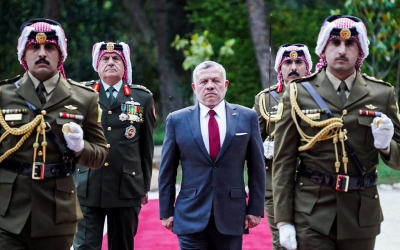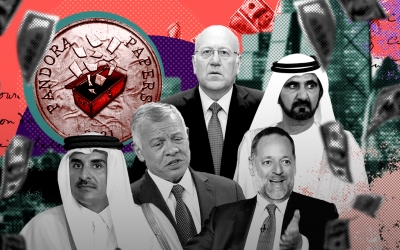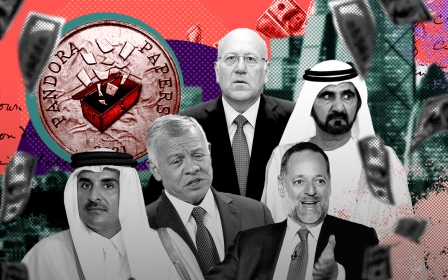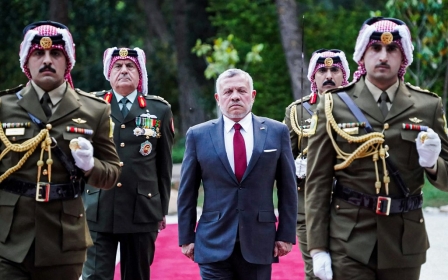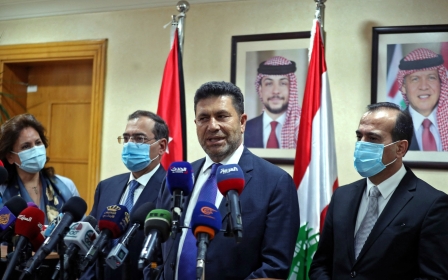Pandora Papers: In Jordan, King Abdullah leaks are met with media blackout
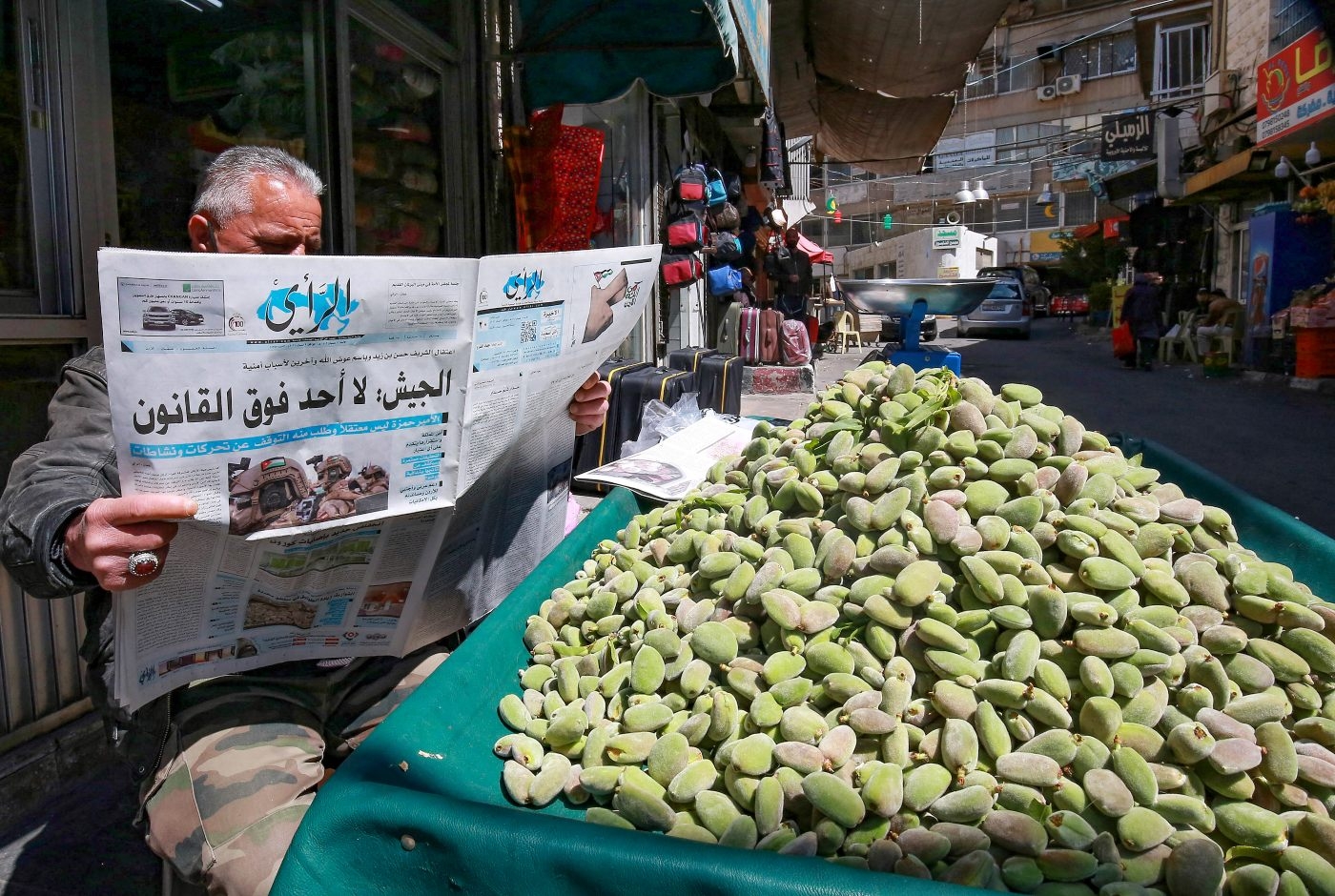
The Pandora Papers leaked over the weekend exposed to the world the expensive real estate dealings of Jordan’s King Abdullah II since he acceded to the throne in 1999. But readers of Jordanian media outlets would be none the wiser.
Only one news item appeared on Monday - conveying the royal court’s rejection of the claims made by the latest in a series of mass leaks in recent years revealing the questionable financial dealings of countless world leaders and business tycoons.
On a visit to the central Badia region on Monday, Abdullah dismissed the leaks as a targeted crusade by unspecified actors against the country. “There is a campaign against Jordan,” he said. “This is not the first, and we are stronger than these campaigns.”
The media blackout was far from coincidental, journalists in the country told Middle East Eye.
“Pressure from security officials before and after the publication [of the Pandora Papers] ensured that the content of the leaked reports never saw the light of day in Jordan,” one journalist working for a news website told MEE on condition of anonymity.
“I received a call from a Jordanian security official who asked that a news item quoting the BBC be removed from our website,” the journalist added.
Media self-censorship
This is not the first time that Jordanian media has refrained from publishing news critical of the royal family. In April, an alleged sedition plot was put under a court-mandated gag order.
Jihad Abu Beidar, former head of the civil liberties committee in the Jordan Press Association and editor of Al-Taj website, told MEE that experience has taught many journalists to practise self-censorship out of fear of punishment.
“Even on social media, Jordanian journalists are petrified,” Abu Beidar said. “Citizens are losing trust in local media, which has been absent on major stories such as the Pandora leaks. It has not granted the reader their right to know.”
One media outlet, AmmanNet, published a report that lasted three hours before it was erased from its site.
The Centre for Defending Freedom of Journalists (CDFJ) argued in 2020 that the editorial teams of local media had taken on the role of pre-emptive censors, cleaning up the content of any information perceived as contrary to the state’s positions prior to publication.
According to a recent CDFJ survey, 96 percent of journalists questioned said that they practised self-censorship.
For investigative journalist Musab Shawabkeh, the avalanche of pressure to which independent media is subjected is worsened by repressive media laws, under which journalists have been imprisoned - leading them to think twice before writing.
Basel Okor, the publisher of the Jo24 news website, told MEE that while he hadn’t directly been pressured into silence over the Pandora Papers, he had deliberately waited before publishing anything on the subject so as not to be accused of giving the leaked documents any credibility.
“Now that the royal court has responded, there is no sense in blocking what the information revolution has made available to all,” Okor added. “I have asked for transparency with the media, instead of a steel wall that aims at keeping information out.”
‘No pressure’
Jordanian authorities, somewhat unsurprisingly, have denied pressuring news outlets in the country into silence.
“The media was not pressured at all not to publish the documents of the Pandora files, but what happened is that Jordanian media realised there was no value to this information and therefore avoided making the mistake” of publishing it, the director of the government media commission, Tareq Abu Ragheb, told MEE.
“The media realised that it can become a bullet in the hands of those who want to harm Jordan,” Abu Ragheb claimed. “For sure we didn’t intervene or pressure anyone.”
According to the king's lawyers, the monarch is not required to pay taxes under Jordanian law and therefore had done nothing wrong by using offshore tax-havens.
His lawyers also told the International Consortium of Investigative Journalists (ICIJ), which unveiled the Pandora Papers, that the information about the king's properties was not accurate or up to date.
But according to Shawabkeh, who participated in unveiling the 2016 Panama Papers, journalists’ silence was contributing to the media’s lack of credibility in the country.
“The media is not independent and is a coward unwilling to side with the pains of the people, therefore they have lost the people’s trust,” he told MEE. “The royal court’s statement on Monday confirming that the king owns property outside of the country has granted credibility to the foreign press at the expense of local media, which as a result has deepened the chasm with their own public.”
Social media frustration
With newspapers, radio stations and television channels keeping quiet, and ordinary citizens declining to share their thoughts on the matter to MEE in the streets of Amman, social media has remained one of the few avenues where Jordanians have discussed the latest leaks, with the Arabic hashtag “Pandora documents” trending on Twitter in the country.
“Real estate prices are going up, and what the king bought 20 years ago is now worth ten times more, just like property that the late King Hussein owned, to which we don’t know what happened,” Deema Farraj tweeted. “I wish someone would also leak to us what happened to it.”
Many expressed anger about the revelations that King Abdullah secretly spent more than $100m on property in the UK and US while his country struggles with skyrocketing unemployment and austerity measures.
Jordan has long sought to silence those who might question the wealth of King Abdullah II, who has ruled the country for more than two decades.
The alleged sedition plot exposed an unprecedented rift that erupted between Jordan’s ruling family and former crown prince Hamzah bin Hussein, a beloved figure, who criticised the "ruling system" for deciding "its personal interests, that its financial interests, that its corruption is more important than the lives and dignity of [the] futures of 10 million people that live here".
“Jordan… a country of contradictions. Home of the super-rich, while the country’s debt reaches $40 billion,” one social media user summed up on Monday.
Middle East Eye delivers independent and unrivalled coverage and analysis of the Middle East, North Africa and beyond. To learn more about republishing this content and the associated fees, please fill out this form. More about MEE can be found here.


